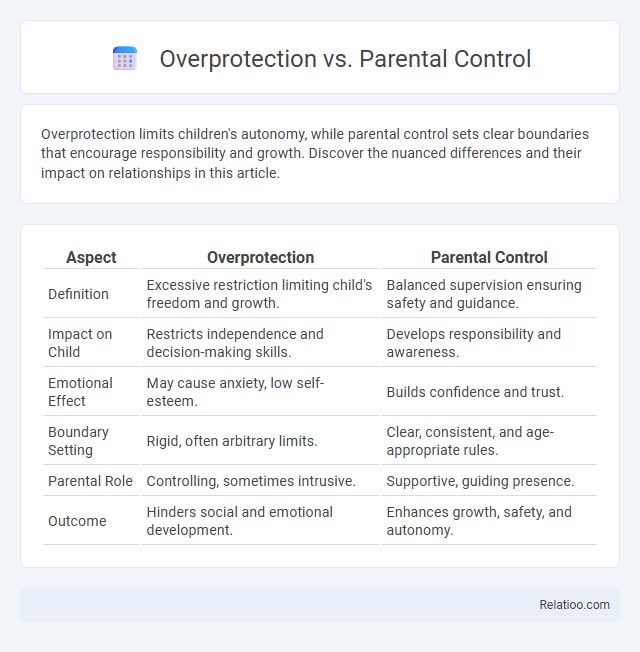Overprotection limits children's autonomy, while parental control sets clear boundaries that encourage responsibility and growth. Discover the nuanced differences and their impact on relationships in this article.
Table of Comparison
| Aspect | Overprotection | Parental Control |
|---|---|---|
| Definition | Excessive restriction limiting child's freedom and growth. | Balanced supervision ensuring safety and guidance. |
| Impact on Child | Restricts independence and decision-making skills. | Develops responsibility and awareness. |
| Emotional Effect | May cause anxiety, low self-esteem. | Builds confidence and trust. |
| Boundary Setting | Rigid, often arbitrary limits. | Clear, consistent, and age-appropriate rules. |
| Parental Role | Controlling, sometimes intrusive. | Supportive, guiding presence. |
| Outcome | Hinders social and emotional development. | Enhances growth, safety, and autonomy. |
Understanding Overprotection and Parental Control
Overprotection involves excessive shielding of children from potential risks, which can hinder their emotional and social development, while parental control refers to setting appropriate boundaries and guidelines to ensure safety and discipline. Understanding the distinction is crucial, as balanced parental control fosters independence and responsibility, whereas overprotection can lead to dependence and anxiety. Research shows that optimal parenting combines clear rules with support for autonomy to promote healthy child development.
Key Differences Between Overprotection and Parental Control
Parental control involves setting boundaries and guidance to ensure a child's safety and development, using tools like monitoring internet usage or establishing rules for curfews. Overprotection exceeds these limits by restricting a child's autonomy and exposure to normal risks, often hindering independence and decision-making skills. Key differences lie in the intent and impact: parental control aims at balanced supervision, while overprotection leads to excessive limitations that can impair emotional growth.
Psychological Impact on Children
Overprotection often stifles a child's emotional growth by limiting their ability to face challenges, leading to increased anxiety and reduced resilience. Parental control, when balanced, sets clear boundaries that foster security and discipline, but excessive control can diminish autonomy and self-esteem. Your approach to managing these parenting styles directly impacts your child's mental health, influencing their confidence and social development.
Signs of Overprotective Parenting
Signs of overprotective parenting include excessive monitoring of Your child's activities, limiting their independence, and making decisions on their behalf without allowing them to learn from mistakes. Parents may frequently intervene in social situations and discourage risk-taking, which can hinder the child's emotional and social development. This behavior often blurs the line between parental control and overprotection, impacting Your child's ability to build resilience and self-confidence.
Healthy Parental Control Strategies
Healthy parental control strategies balance guidance and independence, enabling children to develop autonomy while ensuring safety. Unlike overprotection, which restricts experiences and stunts emotional growth, effective control uses clear communication, consistent boundaries, and supportive supervision. Emphasizing trust and age-appropriate decision-making fosters resilience and confidence in children's development.
Effects on Child Independence and Confidence
Excessive parental control limits Your child's opportunities to make decisions, which can hinder the development of independence and self-confidence. Overprotection further restricts experiential learning, leading to increased anxiety and decreased problem-solving skills. Balanced parenting fosters resilience and autonomy by allowing children to navigate challenges while feeling supported.
Age-Appropriate Boundaries and Freedom
Age-appropriate boundaries balance parental control and freedom, allowing children to develop autonomy while ensuring safety. Overprotection often restricts your child's opportunities to learn from experiences, hindering emotional growth and independence. Establishing clear, reasonable limits tailored to a child's developmental stage supports confidence and responsible decision-making.
Balancing Guidance and Autonomy
Balancing guidance and autonomy requires distinguishing between parental control, overprotection, and appropriate supervision to support your child's development. Excessive parental control may limit independence, while overprotection can inhibit essential life skills and resilience. Striking the right balance fosters confident decision-making and emotional growth by providing structure without stifling autonomy.
Long-Term Consequences for Family Dynamics
Overprotection often leads to dependency and reduced autonomy in children, while strict parental control can foster rebellion and weaken trust within the family. The long-term consequences include strained communication, impaired emotional development, and challenges in establishing healthy boundaries. Your ability to balance guidance with independence is crucial for nurturing resilience and positive family dynamics.
Practical Tips for Parents to Find the Right Balance
Finding the right balance between overprotection, parental control, and fostering independence requires setting clear boundaries that promote safety while encouraging your child's decision-making skills. Utilize age-appropriate rules that evolve as your child matures, allowing them to experience natural consequences within a secure framework. Prioritizing open communication helps you adjust your level of involvement, ensuring your child feels supported but not stifled.

Infographic: Overprotection vs Parental Control
 relatioo.com
relatioo.com